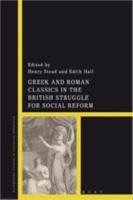
Bloomsbury (2015) h/b 368pp £80 (ISBN 9781472584267)
This is the first substantial published product of the pioneering Arts and Humanities Research Council ‘Classics and Class in Britain 1789-1939’ project, to which Dr Stead, the author of A Cockney Catullus (OUP, 2015), is attached as a postdoctoral student. Prof. Edith Hall needs no authorial—or indeed edithorial—introduction. She inspired and oversaw the 2010 Conference held at the surely classy British Academy on which this published collection is based, and contributes no fewer than three out of its fifteen essays (more than a fifth of the book’s total pages), as well as co-authoring the sparky introduction.
Besides her, there are six other women contributors, and six men including such eminences within the broad field of classical reception as Lorna Hardwick and Christopher Stray. The collection is full of unexpected gems, e.g. R.H. Tawney teaching a WEA (Workers Educational Association) class in Rochdale in 1908 (that from an essay on the WEA by Barbara Goff), or the fact that Mary Agnes Hamilton, elected MP for Blackheath in 1929, was classically educated (from an essay by Hall on classically educated women within the ILP—not the ‘Labour Party’ as the running heads have it).
It is invidious to pick out particular essays, perhaps, but I was especially struck by Paula James’ recasting of Heracles/Hercules as ‘a symbol of Labour: a Nineteenth-century Class-conflicted hero’ (‘The Philanthropic Hercules Association was part of a campaign to ensure that the skilled wage-earner, a decent and valuable member of society, gained a fair price for his labour’—who would have guessed?), and by Justine McConnell’s play with the classical engagement of another James, the Trinidadian C.L.R., author of Black Jacobins—hence her essay’s challenging title ‘Staging the Haitian Revolution in London. Britain, the West Indies and C.L.R. James’s Toussaint Louverture’.
On the other hand, I missed a proper discussion—as opposed to a mere mention—of E.S. Beesly, a member of the First International as well as Professor of Latin at Bedford College, London, a women-only college graced also by Mary Ann Evans a.k.a. George Eliot. And another Evans, George Ewart, does not, I believe, get a mention at all; at least he is not indexed (but then neither is Beesly—see p. 201). Born into a South Wales mining family, Evans, after taking a degree in Classics from Cardiff University, taught at Sawston Village College before graduating to distinction as an oral historian of rural East Anglia and author prominently of Ask the Fellows Who Cut the Hay.
This is as mentioned a pioneering project, and one full of potential for expansion and elaboration in terms both of subjects and of individuals.
Paul Cartledge—Clare College, Cambridge
